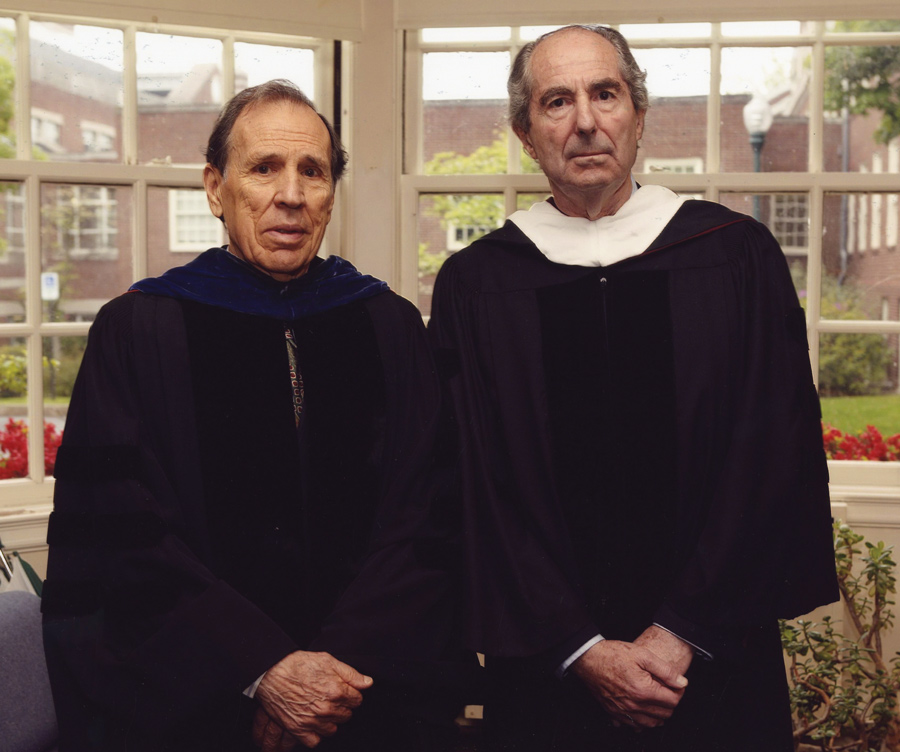

We sought out several friends of the author of Portnoy’s Complaint, American Pastoral, The Human Stain, The Plot Against America and nearly 20 other novels, for comments, including his fellow Pulitzer Prize-winner, the poet Peter Balakian ’73, P’10 who spent an afternoon talking with Roth at his Manhattan apartment last fall. “I found Philip warm and friendly — and happy to reminisce,” says Balakian. “I asked him a lot about his college days, and he said, ‘I have nothing but good feelings about Bucknell — the place did a lot for me.’
“He reminisced about how Jack [Wheatcroft ’49] encouraged him to write about his Jewish Newark, N.J., family and culture, and I mentioned to Roth how bullish Jack had been with me at the start about writing about my Armenian New Jersey-New York City family culture and history,” Balakian adds.
“Philip was an important part of our Bucknell literary community and had been Professor Mildred Martin’s star student,” Balakian continues. “She took great pride in Philip’s work and was a kind of mothering figure to him. Philip told me that he returned to Bucknell almost every year in August until Mildred’s death [in 1995] to spend a day or two, and he always stayed with Mildred at her house on South Water Street. I had no idea he was so attached to the place — that it was part of his yearly ritual to touch base with Lewisburg.”
Another Bucknell friend recently traded messages with Roth. “Philip Roth and I were friends for 66 years, since we met at Bucknell in 1952,” says Jane Brown Maas ’53. “He emailed me just a few weeks ago with a list of the next three books that I must read. I was in the middle of one, and drafting a letter to him about it when I learned of his death. What most people didn’t know about Philip was how kind and caring he was, how loyal to friends, how gentle a soul. I will miss him very much.”
Maas was instrumental in arranging what is considered to be Roth’s last published work. (Roth officially retired from writing in 2012.) His tribute to his mentor, Wheatcroft, who died in January 2017, appeared in the fall 2017 issue of Bucknell Magazine. With that publication, Roth seems to have come full circle, for his first publication was also at Bucknell, according to the Philip Roth Society.
Another friend who can attest to Roth’s concern for others is Eleanor Mackie Pigman ’55. She met Roth during her first days on campus, when first-year students had to wear signs around their necks with their high schools and hometowns inscribed. “He stopped me on the path and asked if I was OK,” she recalls. “I thought, ‘Who is this tall, well-dressed, dark-haired guy?’ ” Roth had attended a neighboring high school in northern New Jersey and had seen her sign. “He wanted to big brother me,” she says.
Pigman describes a potent memory of Roth as a student: “He was so attractive and had the most beautiful cashmere sweaters. That black cashmere sweater with his black hair …”
On campus today, Roth is recalled as “a champion of young writers,” according to Professor Robert Rosenberg, English. In 1992, the Philip Roth Residence in Creative Writing program was established. Each year, two promising writers are granted a semester to pour all their energies into their work, with free lodging and a $5,000 stipend.
The program, says Rosenberg, “gave so many talented early novelists and poets the gift of uninterrupted time to finish their first books. As a teacher of creative writing at Bucknell, it’s always been inspiring to remind my students that one of America’s greatest novelists sat in these classrooms, lived in these dormitories. It’s been a powerful way of reinforcing that, like Philip Roth, they too might write something that will stand as a legacy, a testament of the times.”
Blake Bailey, who is writing a biography of Roth slated for publication in 2021, confirmed that the Bucknell Magazine essay is thought to be his last published work. He stressed Bucknell’s importance in Roth’s life, which will be documented in two chapters of the book. “Philip cherished his years at Bucknell, where he found friends and mentors he stayed in touch with for the rest of his life.”